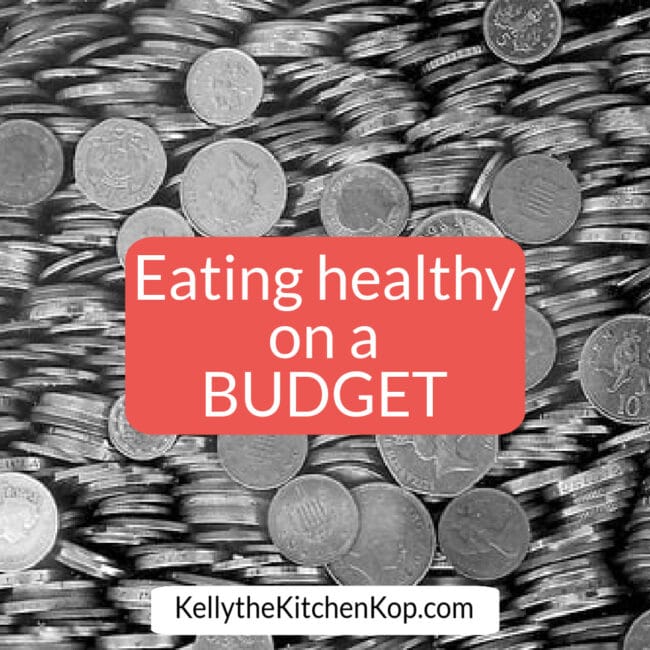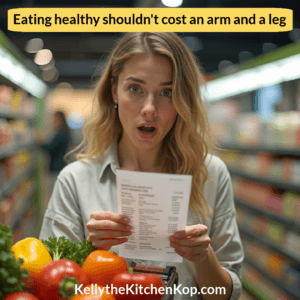
I'll start right off by giving it to you straight: it can be expensive eating healthy foods. However, there really are ways it can be done without hurting TOO much.
Also, don't miss these posts:
Eating Healthy Shouldn't Cost an Arm & a Leg
and
ALL my posts on affording real food are here.
OR if you'd like an entire printable list of ways to save on real food, get that here.
Here are 12 suggestions for eating healthy on a budget:
- Figure out what your family eats the most of and start with that. For us a big one used to be peanut butter, so I went to all organic. (These days it's much easier because the organic peanut butters are awesome – smooth and yummy, but when I began eating healthier they were all still that hard stuff that you broke your arm trying to stir it before you could get a knife in. I still got my kids to eat it, but it wasn't easy. I had to start by sneaking half a jar of the healthy peanut butter into half a jar of the nasty stuff that still had trans fats in it.) Slowly start adding other products as you can. I just look around and if there’s an organic, local, or from-the-farm alternative to something we eat a lot of, I start getting it.
- Remember, often food from a local farm is cheaper than the grocery store. Anytime we can decrease the distance and the number of steps from the food source to our table, this not only is more beneficial for our bodies and for our environment, it is often easier on the checkbook, too.
- Keep in mind you can only do what you can do. Try to make the best choices whenever you can, but if you can't afford all organic or to go totally natural, just make it a goal to add more when the budget allows. There's still a lot we could/”should” be doing at our house too, but it isn't always feasible. For example, I do try to use organic as much as possible (local organic is best) – especially if I'm looking at an item with an ingredient label that has seed oils, high fructose corn syrup, MSG, or long words listed that I have no idea what they are–this usually means it has some funky chemicals/preservatives in it. But sometimes you'll see a non-organic ingredient list that isn't TOO long or TOO full of junk. So if it is an item with an organic version that is much more expensive, I'll go with the non-organic one to save money. Just don't beat yourself up over it, do the best you can and make the best choices with what you've got.
- Remember that you'll be saving money on the junk you won't be buying anymore! This is huge when you think about how much “sugar bomb” boxed cereals cost, how quickly you can burn through money on eating out/fast food and how much other packaged/processed/junk foods are!
- Plant a garden. We spend a LOT of money at our farm market every Saturday in the summer. Eventually we'll plant a garden. My brother, Doug, insists it is very easy, very cheap, doesn't take much time, and he loves how good it feels to be self-sufficient in that way and how delicious everything is. He also was able to grow it all organically! He gave me some cherry tomatoes that I made some yummy pizza sauce with last summer and my kids were popping them like candy, they were so sweet. There's nothing like the taste of veggies that haven't traveled thousands of miles to get to you, that were grown in healthy soil, and when you know who grew them and when they were picked. (Update: we've had a garden for a few years now and it's SO fun cooking with food you got from your own backyard!)
- Buy in bulk when you can through a local buying club or an Amish store or other bulk foods store. (I go in with friends and we'll split boxes of various foods that we wouldn't go through a whole case of.) Be careful though, for some things your local grocery store might still cheaper than the buying club.
- Buy whatever organics you can find at Sam's Club or Costco. They are hit and miss on items, but have GREAT deals when you can find them.
- If at all possible, don't skimp on meats. But you could make a more budget-friendly meatless meal once or twice a week, here are some great meatless/vegetarian meal ideas. Meat is one thing that is very tempting to buy cheap because it is so costly, but personally, that's something we don't do, unless we're buying prime rib or something very expensive (and we very rarely buy those type of cuts anyway, maybe once a year). Here's more on why it's so important and what to look for: see this movie on conventional meats. Here's a good source for safe meat if you don't have a local source. (Use the code KOP for a discount.) Best is if you go in with friends to get a 1/4 or 1/2 of a cow or pig from your favorite local farmer, meat is much cheaper that way, you just have to budget ahead for the big purchase and make sure you have room in your freezers!
- Do some meal planning/make detailed grocery lists. Try to sit down once a week and get a general idea of what you'll be making for meals, then make a detailed grocery list. The less I go to the store, the less I spend, and if I have a good list, it really does cut down on the impulse buys.
- Keep your kitchen well-stocked. I'm a freak about always having extra of almost everything on hand, that way I don't have to do last minute trips to the store and then spend more money. I also keep a “freezer inventory” list on the frig telling what I currently have on hand. This is great when I'm trying to figure out what to make for dinner, or so I can see when we'll need to make another meat run to the farm. (Update: now I use this app on my phone!)
- Make your own healthy sourdough bread. You can save a lot this way.
- Again, get an entire printable list of ways to save on real food here.
No matter how you're able to incorporate healthier eating habits into your home, just that you're thinking about these things shows your much further along in your journey toward good health than most people. I hope you'll keep reading for more tips as new posts are added!
If you have more tips for eating healthy on a budget, share with us in the comments!
More you might like:
- Read this article from Anne, Eating Healthy Shouldn't Cost You An Arm & A Leg
- Dieting/my “food conversion story”
- Easy Meatless/Vegetarian/Lenten Meal Ideas
- Excellent Popcorn recipe – it blows microwaved popcorn away!
- Eating healthy, without sacrifices







Allyson Bossie says
Kelly, I have been growing a garden for three years and after 3 years of composting it, I finally have soil well enough for a garden that produced everything (last 3 years, just eggplant and cucumbers grew). Anyways, I wanted to share something to help save money on canning.
Two things actually. Check your local recycle center or “dump” A lot of times they have a space where people can bring perfectly good items they no longer use. I have gotten at LEAST 3 dozen quart sized ball jars there, usually 2-3 jars at a time. You take them home and sterilize them anyways, so they are perfectly fine. I stumbled on this as I was taking my trash (we have no trash service out where we live), and I always check for jars now!
Now one everyone can do: Tattler canning lids. They are pricier upfront, but if you care for them properly, they last for life. It’s a lid with a rubber gasket separate. I currently am on 3 processes with some lids and they are running strong. Now, I am unsure if they are better for you than the metal lids, but I don’t know which is worse, that nasty metal that flavors the food, or the plastic (unsure if it’s BPA free, honestly) lid on my jars….It’s one of those that you have to just do a toss up and decide personally I suppose
Heather says
Thank you for all the great tips! I wanted to throw one your way… You talked about how your family can’t agree on a whole wheat brand of bread. I found out about ‘Alvarado Street Bakery’ brand of sprouted whole wheat, or sprouted whole wheat with flax seed… Etc. They have a few different types of bread all organic & all made from sprouted whole wheat. If I remember correctly it’s a 5 on the glycemic index ( Which is crazy low for any type of ‘bread’. All types I’ve tried have been delicious too!! They have a website you can order it off of if you can’t find it in the store but I’ve seen it at Trader Joes & Safeway. Totally worth checking out!
Heather (not the same Heather!) says
I’m pretty sure the Trader Joe’s branded sprouted breads come from Alvarado Street Bakery, as well. We love their Sprouted Rye!
Kelly the Kitchen Kop says
I got to meet these guys from Alvarado St. Bakery at Expo West, they are awesome!
Crystal says
Thanks Heather! And I agree about the cable.. I wish we didn’t have it but our inlaws got us some kind of bundle deal so they pay for internet and cable! I could do without the TV!
Crystal says
Thanks Kelly! I do love your site and I do read as much as I can. Most months the only thing I can do is get a little grass fed beef, butter, eggs and maybe a gallon of milk from a local dairy. We don’t have a lot of resources available where I live but we do have this great dairy farm that sells milk that is not homogenized. We get most of our milk from WIC but I do try to buy a gallon a month. They also make cheeses, which is a splurge but we do get it on occasion. The eggs they sell are from local farmers and we try to get a dozen a month (we also get eggs with WIC). And their ground beef is so good! It’s nice to be able to see the cows so you know where your milk and beef are coming from. We get $100 a month from our (other set) of inlaws and we use that money for the good stuff as long as we don’t have any extra expenses like medical, repairs ect.
While it’s not organic or raw… it’s a far cry above the rest!
Here is their site: https://www.wrightdairy.com/
Organic veggies and fruits are very hard to come by but this summer my dad had an awesome garden and we benefited from that! And he just brought over a huge bag of apples from his apple trees! I rarely buy any processed foods, except for the cereals we get with WIC. I try to make most of our snacks at home.
So, yeah, I do what I can. But I wish I can do more.. and hopefully some day I will!
Heather says
@ Crystal: I would NEVER grudge anyone considering their internet connection to be a utility right up there with power & water! Once upon a time, it was more of an entertainment thing, but now it’s such a vehicle for information and for getting many things done efficiently that I consider it as a utility. Get the cheapest decent connection you can, of course, and, of course, internet totally trumps paying for cable TV. But don’t feel guilty about making sure you are connected to what is probably the greatest force for information in the world, as well as the greatest hope for enhancing freedom in the world.
KitchenKop says
Crystal,
This is what I tell people: the fact that you’re on this blog, reading about health & nutrition says so much! It says that you’re further along than many will ever be, and if you keep reading, not only will you learn affordable tips along the way, you’ll also be SO ready for when you DO have more resources, to afford more of the quality foods.
For now just do what you can!! That’s all you can do!! Feeling guilty doesn’t get you anywhere. You’re kids are so blessed to have a Mom who “gets it” and is doing her very best and living within her means – that’s a great lesson in itself.
Kelly
Crystal says
I was just poking around your site and found this. Thanks. I do beat myself up because there is SO much I can’t do. We are on WIC, so we get our milk, bread, ect through that. And since my youngest just turned 2 we can only get 2% milk. It’s so annoying. But we can barely afford our groceries as it is. I really do try, but when your income is soooo slim, it’s hard.
BTW, I feel the need to say that our internet is paid for by our inlaws… My husband is in school (yay for grants) so they offered to pay for it for him. Otherwise we wouldn’t have it. I always think someone might say, “Well, you have enough money to pay for your internet every month.. maybe you should spend that on better food!”
I do live with so much guilt over what I can’t do though.
Heather says
I haven’t seen an organic whole wheat bread at our Costco, but their Kirkland brand multi-grain is a decent non-organic bread, & is under $2/loaf, which means it beats out anything anyone else carries, even Trader Joe’s. If Sam’s Club sells organic anything these days, mine doesn’t carry it. Annoying, because Sam’s is close enough to walk to & Costco is 25 miles from here–but Costco is totally eating Sam’s Club’s lunch on both price & quality. For example: Sam’s Club carries a 5$ bag of frozen corn for a certain price. So does Costco–for about the same price, but their corn is organic. (Yeah, fresh is best, but frozen veggies have their uses).
Vera says
I’m going to show this to my mom, I’ve been hounding her to buy the better and tastier, but more expensive eggs. This should do the trick.
Kelly the Kitchen Kop says
Thanks Kara, I love that cornucopia site.
Kelly
Kara says
Hi Kelly (and this is a response to Molly’s post too) –
I really love this blog post; it sounds like you have a fairly strong knowledge and appreciation of organics. Here’s one thing you might want to look at though:
https://www.gourmet.com/foodpolitics/2008/06/politicsoftheplate_06_03_08
Specifically, Tyson had to remove labels claiming that its chicken was raised without antibiotics. As I mentioned earlier, you seem to have a very good knowledge of organics already. Still, as a word of advice, you should be wary trusting big meat-producing companies like Tyson; it’s better to buy local (as you mentioned in your post) because its easier to trace the origins and farming practices of the farmers who produced your cut of meat. The same applies to milk: https://www.cornucopia.org/dairysurvey/index.html
or https://www.cornucopia.org/2008/01/dairy-report-and-scorecard/
(check out how your favorite grocery store brands stock up). If you’re going to pay premium for better milk, you want to make sure you’re getting what you’re paying for.
Have a good day!
Holly says
I do get the milk at Meijer. I will check the price at the C-store. That is where I originally began purchasing it. I always thought that was comical. “I have to go out to the GAS station to get my premium milk. I’ll be right back!” ha-ha!
Kelly says
Holly,
Thanks for your comment!
Do you get your hormone/antibiotic free milk at Meijer? Because at the local gas stations it’s much less for the same milk. (Country Dairy)
The Tyson brand you mentioned does sound like a better choice than conventional chicken, and I’m glad grocery stores are starting to listen more to what customers want. I usually prefer getting chicken at Creswick or other local farms where I know how it was raised and this also lowers the “steps to the table” number too, but an in-between chicken we sometimes buy is Hefferon Farms. (For locals: it’s on Plainfield by MC Sports.) I say in-between because they are raised locally with no hormones or antibiotics, but I don’t know what they’re fed or other things about how they’re raised. Buying food locally does add another stop for food, but decreasing the number of middle-men is worth it to us. I know it’s not worth it to everyone, we all just do what we can do!
Holly says
I know what you mean about the expenses of things. I buy milk that was produced w/o growth hormones and it costs about a dollar a gallon more than regular, but it figure it is worth it. (It is still much less than the organic milk!)
I also buy the Tyson chicken from Meijer that was raised without antibiotics and growth hormones AND does NOT contain “a solution of up to 15% chicken broth”. It usually costs more and doesn’t go on sale as much. Yesterday I went in and they were low on the product AGAIN and I asked the meat guy if they were getting rid of it and he said no. I was glad because I would have to put up a fuss!
I would eventually hope to get the time and energy to get more local stuff, but I also think if we press our local grocery stores to carry better products, and then regularly purchase them, that works better for everyone too.